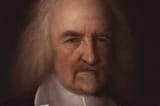Search Results
ID: Zntmgvwr/pol/512293021#512301167
8/5/2025, 6:46:12 PM
>>512300411
Hobbes discussed this in the 17th century.
In his view, in a natural state without government, life is violent and chaotic ("solitary, poor, nasty, brutish, and short"). To escape this, individuals use reason to recognize that peace is in their best interest. They agree to mutual rules—like the Golden Rule ("do unto others as you would have them do unto you) to ensure their own safety and well-being.
For Hobbes this idea that living in a civilised society is better than living in a state of nature, and that it is reliant on suppression of our base drives, has "a priori" status. We use our inherent sense of reason to work this out.
Hobbes discussed this in the 17th century.
In his view, in a natural state without government, life is violent and chaotic ("solitary, poor, nasty, brutish, and short"). To escape this, individuals use reason to recognize that peace is in their best interest. They agree to mutual rules—like the Golden Rule ("do unto others as you would have them do unto you) to ensure their own safety and well-being.
For Hobbes this idea that living in a civilised society is better than living in a state of nature, and that it is reliant on suppression of our base drives, has "a priori" status. We use our inherent sense of reason to work this out.
Page 1
